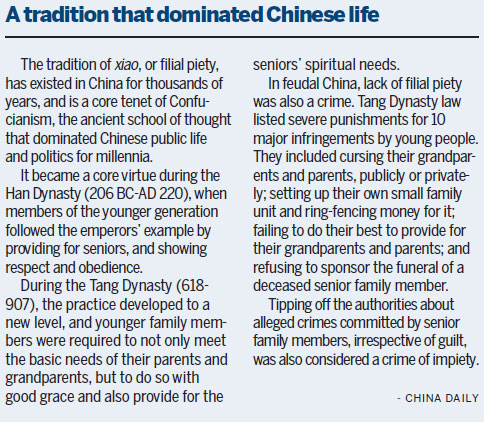A family affair?
By Xin Dingding (China Daily) Updated: 2015-12-23 07:56Similar stances
The problem is attracting growing public attention. Many employers are adopting a similar stance to Lyu's beauty salon with the aim of encouraging greater filial piety among employees, except the money that is wired to employees' parents is not deducted from staff salaries.
Lai Jiaming, the waiter in Shenzhen, said that since 2012 his boss has wired money to the parents of employees who have worked at the restaurant for more than a year. Unlike Lyu's salon, though, the money is donated by the owner, so staff wages are not affected.
Since the end of 2013, the Hengshui Runlu Food Co, in Hengshui, Hebei province, has wired money to the parents of all employees who have worked for the company for two years. According to sales manager Xie Mingxing, the chairman of the board believes people who don't value filial piety should not be employed by the company.
Liu, the sociologist, said that as long as money isn't deducted from employees' salaries, companies should be encouraged to contribute if they choose to do so.
In addition to promoting the practice, the policy gives employees a sense of belonging, while their parents will be more likely to approve of their children working for such socially conscious companies, he added.
However, the government needs to echo the good examples set by businesses, and should shoulder the primary responsibility of promoting and reinstating filial piety to make it a core value of modern China, according to Liu.
"It is crucial if rural China is to develop properly," he said.
Xu Jingxi in Guangzhou contributed to this story.

- China to sink billions into new airports
- More high-speed services to be added
- Lunar mission moves a step closer
- Southwest China city tries to help make smog-free meat
- Watchdog issues rare comment on execs' porn prosecution
- Tourism revenue in Tibet's Lhasa to double by 2020
- China overfulfills affordable housing target
- Bumper crops fill reserves
- Awards honor scientists' contributions
- Chinese police seize 470 suspects in transnational telecom fraud







